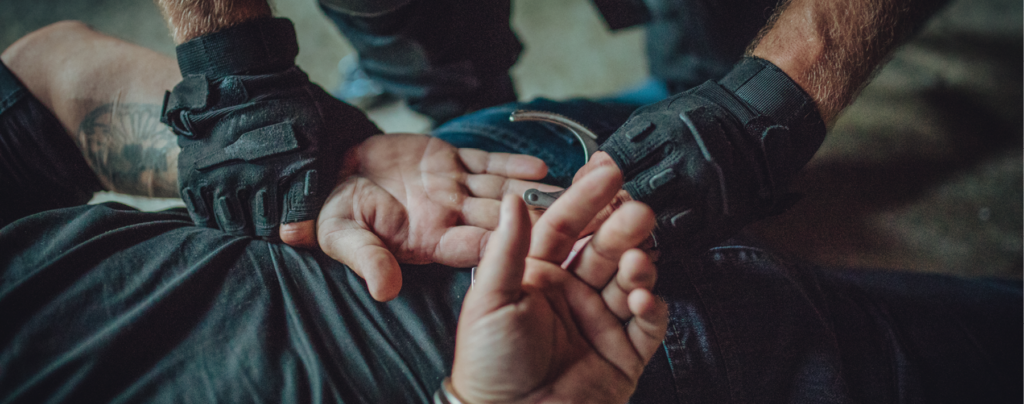Hoover v. Due, 2025 WL 2658617 (6th Cir. 2025)
Chelsea Hoover and her friend, Ashley Kinnett, were at a bar when Chelsea received a text message from her mother saying her husband Michael was moving her belongings outside of their shared home. The two women rushed to the Hoover residence. Soon thereafter, a 911 caller (assumedly Chelsea or Kinnett) reported a “domestic in progress” at the Hoovers’ residence. The caller reported Michael had “grabbed her by the neck.”
Putnam County (Tenn.) Sheriff’s Deputy Justin Due responded, along with another deputy. The dispatcher warned the deputies there were “weapons on scene” and that the caller said “the male threatened her with a gun.” Deputy Due arrived first, before his backup deputy.
Ashley Kinnett approached Deputy Due as soon as he parked his car. Kinnett told the deputy Michael had “gone crazy,” and she pointed at the man standing in the threshold of the garage. Just then, Chelsea walked out of the garage while her mother remained inside, tending to the Hoovers’ young daughter.
Deputy Due approached the open garage and ordered Michael to show his hands. Michael raised both of his hands. Deputy Due drew his gun and motioned for Michael to come off the steps and into the garage. Michael kept his hands raised but remained in the doorway. Deputy Due could not see past him. Michael told Deputy Due, “Don’t be drawin’ out on me. I’ve not done anything wrong. Why are you getting aggressive?” Deputy Due replied, “Well, she’s saying you pulled a gun out on her.” Michael responded, “Okay, so you’re taking her word over anything else?” He then pulled up his shirt a few inches and turned to show Deputy Due he did not have a gun in his waistband.
Deputy Due commanded Michael to put his hands behind his back. As Due reached out to grab the man’s right wrist, Michael backed into his house. He told Deputy Due, “[Y]ou ain’t handcuffing me in my house.” Deputy Due said he was, and followed Michael inside his house. Deputy Due tried to grab Michael’s arm to turn him around, but as he did so, Michael cinched his left arm around the deputy’s right arm at the elbow, briefly holding Deputy Due in an arm lock. He then broke free from Deputy Due’s grip.
Deputy Due punched Hoover in the face. The scuffling continued for a few more seconds until Chelsea and her mother told Deputy Due that Michael had never pulled a gun. Deputy Due immediately backed off and stopped trying to arrest Michael Hoover.
“A 911 call, vaguely reporting an altercation, is not enough to justify an officer’s warrantless entry into a home.”
Hoover sued, alleging excessive force and claiming Deputy Due’s entry into his home violated the Fourth Amendment. The trial court denied summary judgment to Deputy Due. Due appealed, claiming he was entitled to qualified immunity.
Deputy Due argued his warrantless entry was justified under the exigent circumstances doctrine because he was responding to a 911 call reporting a domestic assault and that a man had threatened to use a gun against the caller. He also argued Kinnett’s statements that Michael Hoover had “ gone crazy” and “[T]here he is at the door” further supported the claim of exigency.
The appellate court disagreed: “A 911 call, vaguely reporting an altercation, is not enough to justify an officer’s warrantless entry into a home. An officer needs something beyond the present 911 call — whether or not the phone call is anonymous.” When Deputy Due arrived, the court noted, he saw Chelsea Hoover, her mother, and Kinnett standing outside with Hoovers’ daughter and none appeared to be injured or in need of immediate aid. None of the women indicated there was anyone in the house who needed immediate assistance. There were no signs of a fight, no one was belligerent, no one appeared to be intoxicated. Moreover, Michael Hoover fully cooperated with Deputy Due while he was in the garage, up until the moment Due attempted to arrest him.
Though two of the women told Deputy Due that Michael Hoover had not threatened Kinnett with a gun, that was inconsistent with the information relayed by the dispatcher. Deputy Due was worried Hoover could be armed. Even so, the appellate court pointed out that Deputy Due did not see Hoover with a gun, and Hoover had even raised his shirt and turned to display his lack of a gun in his waistband. Deputy Due argued Hoover could have had a gun in his boot or in a pocket. The court opined: “A reasonable jury could conclude that was pure speculation based on no more than a hunch.”
The appellate court held a reasonable jury could agree there were no exigent circumstances justifying the warrantless entry. If the jury reached that conclusion, Deputy Due’s warrantless entry into Hoover’s home violated Hoover’s Fourth Amendment rights. The court also held Deputy Due failed to properly present an argument that his use of force was lawful. Thus, the court upheld the trial court’s denial of summary judgment based on qualified immunity.
Timely legal analysis on law enforcement-related cases: SUBSCRIBE NOW!
Officers are often faced with the decision to enter a home without a warrant when responding to a domestic violence call. Often, officers are given consent to enter by the complaining parties. Other times, there are signs of violence and/or injury that are more likely to create true exigent circumstances. But there are still many incidents where the better legal course is to persuade a person with authority to grant consent, or remain outside and consider tactical options. In some circumstances, seeking a telephonic/remote warrant may be the best course of action. In this case, it was clear the court focused on the lack of violence or injury when the three women and child came out of the garage.




